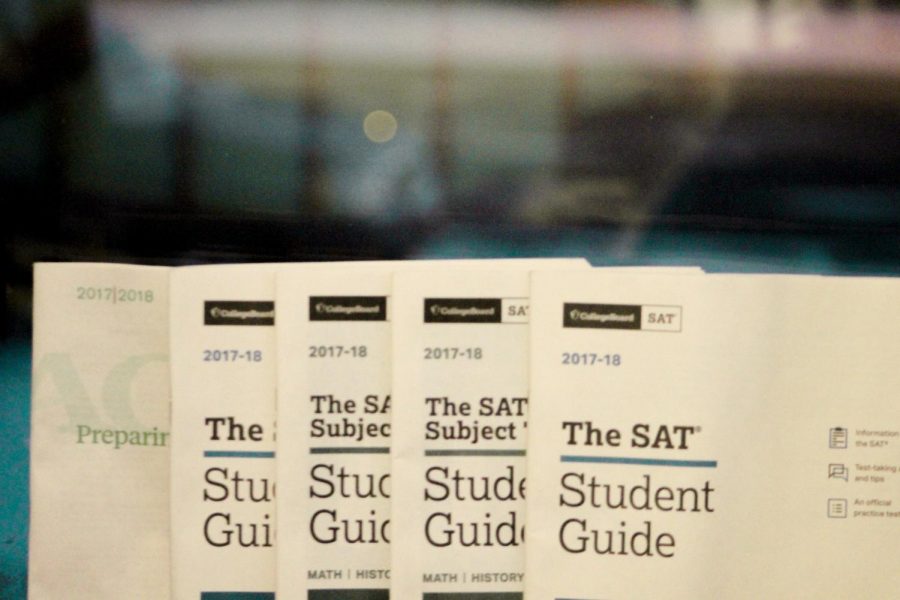Are Standardized Tests Worth It?
Taking a look at the debate
Photo by Nicole Niemiec
An endless stack of testing applications
It’s that time of year again: students stressing over their midterm grades, parents scrambling to sign their kids up for the SAT, teachers hastily preparing for the approaching AP tests. With such a palpable anxiety in the atmosphere, one must raise the question- what purpose do these loathed tests have, if they are necessary at all? The subject of standardized testing has evolved into an intriguing point of contention in the recent years, and has become ever the more crucial for citizens to recognize the system for what it’s worth.
To most students, standardized tests are a huge burden in their academic career. The list itself is enormous: AP Tests, PSATs, SATs, ACTs, SAT Subject Tests, you name it! Besides nourishing a highly competitive environment, one is bound to take into consideration the hefty price of these examinations. Most AP tests cost $94 each, while SATs and ACTs generally cost $45-$60 each, depending on whether a student chooses to take the essay portion. With families unable to provide for as high as hundreds of dollars a year, many have understandably become hostile towards such examinations.
To accommodate, College Board and other institutions implemented half-price fee waivers for all families whose financial situation apply. Moreover, taking standardized tests will ultimately make a full circle later in life. Most colleges and universities require students to send in standardized test scores along with the application; admissions officers utilize this common system as a national/international measure to compare applicants. “Standardized” testing serves as a basis to compare students to each other, straying away from the highly ambiguous weighting and grading policies unique to each school. For example, it is much easier to decipher a 1450 out of 1600 on the SAT than compare Bs with a 90 or a 4.5 GPA. Enrolling in college is essential to a successful career, with 35% of jobs requiring a bachelor’s degree and 30% requiring some college or an associate’s degree. With salaries not nearly increasing at the same rate as the cost for the standard of living, it is crucial to receive a higher education and attain a quality career. So while paying for a $90 test may seem a little pricey at the time, getting into a good college with your standardized test scores and even receiving college credit for your AP courses have a myriad of fiscal advantages in the long-term.
An additional argument one can make against standardized tests involves the idea that a single test should not determine the performance of a student for an entire year. Indubitably, this ideology is agreeable to many parents as well as teachers, whom are often evaluated based on their students’ performances on final exams and state tests. While it is unfortunate for students who may not perform their best on that particular day, taking standardized examinations are an excellent tool to display mastery of a certain subject. In culminating everything a student has learned in the academic year, subject tests are able to evaluate one’s true understanding of the course material. With certain checkpoints assigned to each score, students are able to determine how well versed they are at a particular topic and utilize this knowledge to attend extra help or tutoring to better oneself. Besides, many of these standardized tests, including SATs and ACTs, are offered numerous times throughout the year, some even during the summer. Combined with the provision of makeup sessions, students are certainly not pressured to have only a one-time chance on an exam.
Starting from a young age with state tests and all the way to college entry exams, students encounter a myriad of examinations along their academic paths. Luckily, students are not alone in this fight loving parents and devoted academic staff are available to make sure students are able to manage their time properly and set healthcare as their number one priority. Receiving time management skills and methods of relaxation from professionals such as tutors, guidance counselors, and psychologists are excellent measures to combat anxiety acquired both academically and socially.
Furthermore, the fixated studying preceding standardized tests have far-reaching benefits to the students themselves. Highlighted by the recent implementation of the Common Core curriculum in New York, students have found the skills they have garnered from the practice standardized tests to be of true value. While the physical knowledge needed for a particular question has not changed, the tricky wording of the question may easily stump students. The skill of “reading closely” is a core value of numerous standardized tests, and familiarizing oneself with such will only prove to be favorable. Besides being applicable to any field in the workplace, students will begin to recognize the wide array of skills learned from studying in their everyday classes. Many topics covered by the SAT and ACT are quite applicable to a number of topics, whether it’s the use of parallel syntax in an essay, trigonometric functions in algebra class, or even interpreting a bar graph in physics. With greater comprehension skills acquired through studying for a standardized test, one will surely be better off with their vocabulary usage, writing complexity and reading analysis in whatever job he or she wishes to pursue.
Evidently, standardized testing provides a significant contribution to a successful future, whether one wishes to pursue public policy, secondary education, or even medicine. Although the financial concerns about this system may prove to be distressing to some, these examinations are necessary to render mastery of a subject, in addition to the invaluable skills and academic perks that come in conjunction. As a rapidly evolving society, standardized tests provide a stable foundation that encourages students to better themselves intellectually. The challenges encountered from a particular AP class or an unsatisfactory grade on the ACT will only push future generations to work harder, to rid the wrongs of the past, to discover innovative ideas, and to find a better tomorrow.
So back to the original question, “Are standardized tests worth it?” I’d say a definite “yes”.

Adelphi Quill Award Winner - 3rd Place, Most Outstanding Reporter (2018)
Grade 12
"You can never be overdressed or overeducated." - Oscar Wilde






